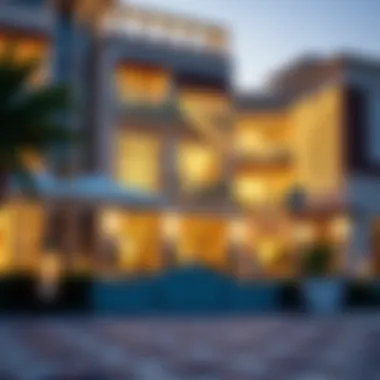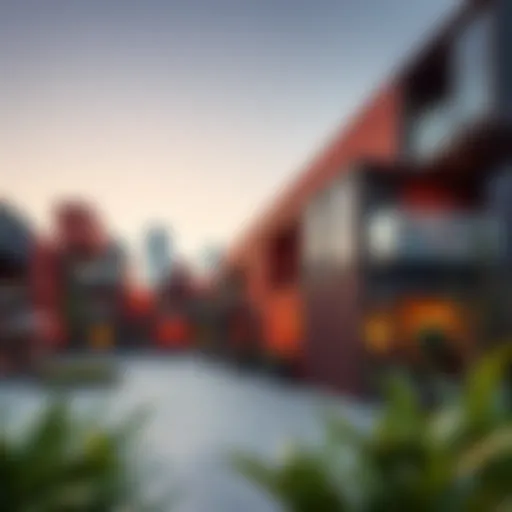Ramadan Kareem 2023 in the UAE: Traditions and Impact


Intro
Ramadan is more than just a period of fasting; it bears deep-rooted cultural significance for millions around the globe. In the UAE, particularly, Ramadan forms a pivotal part of social and economic life. The year 2023 sees a unique convergence of traditions, practices, and behaviors that influence everything from daily routines to the real estate landscape. This article aims to illuminate the essence of Ramadan Kareem as celebrated in the UAE, focusing on its traditions and the accompanying changes in lifestyle that ripple through the expanse of Dubai. Interested in how these shifts impact the real estate market? This exploration offers insights for investors and lifestyle enthusiasts alike.
Market Trends and Insights
Current Trends in Dubai Real Estate
As Ramadan approaches, one can expect to witness significant shifts within the real estate landscape. Many investors look to capitalize on opportunities that arise during this period. Historically, there has been an uptick in community engagement, with many developers offering promotions and community events to foster connection and build relationships. This year, the trend appears to point in two directions: luxury developments that cater to more affluent expatriates and affordable housing options aimed at middle-income families.
"During Ramadan, the notion of community becomes much more pronounced, influencing the types of properties that are in demand."
From the grandeur of Palm Jumeirah to the more modest accommodations in Dubai Marina, it’s clear that location and community engagement play vital roles in property selection. The Islamic practice of gathering for iftar, the meal to break the fast, often involves large family units, which can further influence the demand for larger residences and community-focused apartments.
For instance, discussions around properties in areas like Downtown Dubai are prominent, as many residents look for proximity to mosques and community centers. Buyers and renters seem increasingly interested in homes that facilitate collective experiences during Ramadan, such as communal terraces or shared spaces for large gatherings.
Predictions for Future Market Developments
Looking ahead, one can anticipate a continued emphasis on smart living environments amidst the ongoing technological advancements reshaping the UAE. Ramadan 2023 will likely amplify these trends as communities prioritize convenience and accessibility during the holy month. The demand for tech-enhanced properties with flexible layouts is predicted to rise, aligning with modern family dynamics.
Investors may also find intriguing opportunities in the realm of retail properties. With Muslims engaging in shopping sprees leading up to Eid, those properties located near community hubs are poised for a surge in foot traffic. Expanding upon this, areas with significant iftar gatherings will certainly see increased interest from both retailers and developers keen to tap into this responsiveness to seasonal shifts.
Luxury Developments and Properties
Spotlight on Iconic Developments
For those with an eye on luxury, Ramadan 2023 offers a chance to reflect on premier properties like the Burj Khalifa and developments in areas like Jumeirah and Dubai Marina. Developers are keen to highlight spaces tailored for hosting lavish iftar dinners complete with opulent dining rooms and expansive balconies. Notable projects such as Dubai Creek Harbour bring to light the growing interest in waterfront properties that promote both a luxurious lifestyle and a sense of community.
Investing in Luxury Properties: A Guide
When considering investments in luxury properties during Ramadan, several aspects are worth noting:
- Cultural Relevance: Understand the importance of features that accommodate family gatherings.
- Seasonal Promotions: Many developers roll out special deals during Ramadan. Keep an eye on these offers, as they can provide favorable options.
- Market Research: Engage with real estate consultants well-versed in market demands and trends during Ramadan. They can offer insight on which properties are heating up.
- Long-Term Vision: Think about how your purchase will hold value after the Ramadan season concludes. Make sure the property aligns with broader investment goals.
In summary, Ramadan 2023 in the UAE is set to influence not only cultural practices but also the considerable real estate market. By adapting to shifting demands and exploring new investment avenues, stakeholders can find opportunities that align with both lifestyle preferences and community values. It’s a time that embraces tradition while opening doors to future developments and adjustments.
Understanding Ramadan
Understanding Ramadan is pivotal in grasping the essence of this significant month within the UAE. This is not merely a calendar event; it’s a period steeped in spirituality, communal bonds, and reflection. For investors, homebuyers, or anyone curious about life in the UAE, recognizing the traditions and cultural practices surrounding Ramadan can inform decisions in real estate, lifestyle adjustments, and community engagement. Understanding these nuances allows one to navigate through the month with an appreciation for its values.
Historical Context
The essence of Ramadan stretches back centuries, rooted deeply in Islamic history. It commemorates the month when the Quran was revealed to the Prophet Muhammad. This observance transcends history by offering a call to faith and reminding Muslims of the importance of introspection and piety.
In the early days of Islam, fasting during Ramadan was a means of developing discipline and empathy for those less fortunate. This tradition, fortified through shared experiences and collective worship, reflects the unity of the Muslim community. In the UAE, this historical context has shaped the way Ramadan is experienced today, influencing customs and influencing social behaviors.
Cultural Relevance in the UAE
In the UAE, Ramadan is not just observed; it is celebrated with fervor and dedication. The cultural relevance during this sacred period amplifies the values of generosity, community, and family. As the call to prayer fills the air, the spirit of togetherness swells.
During Ramadan, you'll find iftar gatherings bustling with families and friends breaking their fast with traditional dishes such as dates and laban. These moments create bonds, reinforcing the sense of belonging and shared identity. The hospitality extended to guests during this month is palpable, illustrating the values of generosity and kindness. Namely, it’s common to spot elaborate iftar tents and Ramadan markets sprouting across cities, fostering community spirit.
"Ramadan is a time to reflect, connect, and foster empathy, reminding us of our responsibilities towards one another."
Moreover, understanding the cultural import of Ramadan helps to navigate the real estate landscape during this month. Observing the fluctuating trends, properties targeted for rental during the season, and community initiatives aligned with Ramadan can provide valuable insights for investors. By being attuned to these cultural rhythms, real estate professionals can tailor their strategies and serve their clients better.
The implications of Ramadan are far-reaching, touching everything from consumer habits to investment strategies, all of which warrants close examination. Recognizing these cultural elements holds the key to a deeper engagement with the UAE's dynamic market and its diverse communities.
Key Dates for Ramadan Kareem
The timing of Ramadan is crucial not just spiritually but also practically for those living in the UAE. Understanding the key dates is essential for various aspects of life, from work schedules to family gatherings and, notably, real estate investments. These dates shape not only the ritualistic aspects of the holy month but also the broader economic landscape of the region. For investors and potential homebuyers, being attuned to these dates can guide decision-making, particularly in a market that heavily depends on cultural observances.
Start Date and Moon Sightings
While many may mark the beginning of Ramadan on their calendars, the exact date is determined by moon sightings, which adds a touch of unpredictability to this sacred month. Traditionally, families gather to watch the sky, awaiting the sight of the crescent moon that signals the start of fasting. For Ramadan 2023, the expected start date is March 23, although this can shift slightly depending on the sighting.
This moment is not just about the beginning of a month but marks the launch of a spiritual journey for many. For families, it is the time to set aside ordinary routines and embrace the heart of Ramadan—reflection, prayer, and community. Real estate professionals can benefit from these customs, as many seek to invest during this period, considering factors like expanded community-oriented living environments.
It's worth noting that the demand for rental properties tends to rise around this time as families look for homes that can accommodate large gatherings for Iftar meals and community celebrations. Thus, having clarity on the exact start date becomes essential for investors looking to tap into the seasonal market.
End of Ramadan and Eid Al-Fitr
As Ramadan reaches its culmination, the anticipated day of Eid Al-Fitr—often celebrated with a grand feast and festivities—falls on the 21st of April this year. The end of fasting is marked by community prayers and charitable acts across the UAE, emphasizing the importance of hospitality and generosity that characterizes this time.
Eid invites vibrant celebrations and renewed family ties, leading to various real estate implications. Many people use this period to showcase newly acquired properties or celebrate in their own homes, ensuring that the fabric of community life is woven tightly together during this festive season. For those in the real estate sector, it's a prime opportunity to engage with clients, showcase properties that offer communal spaces for celebrations, and highlight features that facilitate family gatherings.
Moreover, understanding these key points can help identify trends in property demand, whether it be residential homes or investment properties, as the region experiences a temporal shift towards community-centric living during Eid.
"Ramadan's start and end dates are not merely calendar marks; they signify a deeper connection to spiritual and communal values that drive both personal and economic interactions within the UAE."
Navigating the nuances of these key dates allows investors to align their strategies with cultural practices, paving the way for successful investments and a deeper appreciation of the community's lifestyles.


Traditional Practices During Ramadan
The essence of Ramadan in the UAE goes far beyond mere fasting; it embodies a rich tapestry of traditions that unite families, friends, and communities during this sacred month. Traditional practices during Ramadan serve to enhance the spiritual atmosphere, allowing individuals to deepen their connection with their faith and foster a sense of belonging amongst the broader community. Through Iftar gatherings, increased charitable contributions, and various forms of social interaction, participants adapt to a lifestyle intrinsic to Ramadan, providing a space for reflection, gratitude, and social responsibility.
Fasting: Its Spiritual Significance
Fasting, or Sawm, during Ramadan holds profound spiritual significance within the Muslim faith. It's not simply about abstaining from food and drink; it’s a means of self-discipline and a way to cultivate empathy for the less fortunate. As Muslims refrain from consuming any food or drink from dawn until sunset, they embark on a journey of spiritual self-reflection and purification.
This month encourages believers to detach from worldly distractions and renew their faith. It’s seen as a time for personal growth, where individuals consciously pursue acts of kindness and charity. The fast serves to awaken a sense of gratitude for the simple blessings often taken for granted, fostering a mindset of humility. Additionally, this practice strengthens communal bonds as families break their fast together, sharing stories and fostering closeness.
Iftar: Breaking the Fast
Iftar is the meal that marks the breaking of the fast, and it carries significant cultural weight during Ramadan. As the sun sets, the call to prayer signals the end of the day’s fast, leading to a joyous gathering where families and friends come together.
Popular Iftar Spots
In the UAE, particularly in cities like Dubai and Abu Dhabi, there are numerous popular spots that offer unique Iftar experiences. Hotels, restaurants, and community centers prepare elaborate buffets featuring a plethora of traditional dishes, ranging from dates and water to heartier fare like harees and shorbat.
These venues are not just about food; they embody a communal spirit. A key characteristic of these spots is their ability to cater to diverse palates, often incorporating global cuisines. Al Fanar Restaurant & Cafe, for instance, is well-known for its authentic Emirati dishes, while Ramadan Nights at the Burj Khalifa offers a stunning view alongside traditional meals.
The unique feature of these popular Iftar spots lies in their atmosphere. The elaborate setups with gorgeous decorations create an enchanting ambiance where one can feel the Ramadan spirit immersively. However, the rush during peak evening hours can lead to crowded spaces, which might detract from the tranquility of breaking fast.
Community Iftar Events
Community Iftar events play a crucial role in fostering social cohesion during Ramadan. Organised in public spaces, mosques, and community centers, these gatherings are an invitation for all, regardless of their background or beliefs, to share in the breaking of the fast.
A standout aspect of community Iftar events is their emphasis on inclusivity. Often, local organizations and charitable groups sponsor these events, providing meals for the less privileged. This characteristic embodies the spirit of Zakat (charity), fortifying community ties while promoting altruism.
The unique feature here is that these events often include entertainment or educational components such as discussions about Ramadan or cultural showcases, enriching the experience further. Yet, one challenge can be the logistics of accommodating large numbers, which sometimes affects the quality of service provided or the availability of food.
In summary, traditional practices during Ramadan—especially the significance of fasting and the communal experience of Iftar—are pivotal to understanding the cultural fabric of the UAE during this holy month. They reveal how societal norms, community values, and religious traditions intertwine to create a meaningful and enriching experience.
Ramadan Customs in the UAE
Ramadan represents a time of reflection, community, and deeper spiritual awareness for Muslims all over the world, but nowhere is it more vividly celebrated than in the UAE. This month, imbued with rich traditions, shapes not only personal lives but also the broader structures in society—like real estate and business behaviors. Comprehending the customs of Ramadan enables investors, homebuyers, and residents to navigate the UAE landscape more astutely, recognizing opportunities that may arise from cultural shifts.
Charitable Acts and Zakat
One significant tradition during Ramadan is charity—specifically the practice of Zakat. This form of almsgiving is not just a customary action; it's a pillar of Islam. Many choose to fulfill their Zakat obligations during Ramadan, as it is believed that the rewards for good deeds are multiplied. Charity plays a crucial role during this holy month, contributing to the well-being of the less fortunate.
In the UAE, various organizations facilitate donations and charity drives. Here are some examples:
- The UAE Red Crescent: Engaging in projects that provide food, medical assistance, and shelter to those in need.
- Dubai Cares: Focusing on enhancing education for disadvantaged children in developing countries.
- Local Mosques: Often serve as collection points for donations and host Iftar meals for the needy.
By ensuring that everyone participates in these charitable acts, communities strengthen their social fabric. Consequently, this spirit of giving could drive a surge in the popularity of communal living spaces or developments that support community interaction. Marketers in the real estate sector can tap into this charitable ethos by promoting properties that promote community bonds and shared resources.
Family Gatherings and Hospitality
Family gatherings are another cornerstone of Ramadan customs in the UAE. Iftar—the meal to break the fast—transforms into a grand event, often drawing friends and families together. These gatherings can range from intimate home settings to lavish feasts in upscale restaurants. This is a time for families to bond, share stories, and strengthen their connections, forming the backbone of social life.
Hospitality, too, takes center stage during this month. It's customary to invite others for Iftar, even those who are not family members. Such open-door policies encourage a sense of belonging and community. Households might engage in providing meals for neighbors or the less fortunate, transcending economic barriers.
For real estate investors, this focus on family and hospitality can translate into increased demands for larger living spaces and communal areas in properties. Potential buyers might be on the lookout for homes conducive to hosting gatherings—think of spacious dining areas or outdoor spaces. With the right strategies, property developers can cater to this need, designing spaces that reflect the warmth and togetherness central to Ramadan.
“Embracing the customs of Ramadan brings people together while offering unique insights for strategic investment in real estate.”
Lifestyle Adjustments During Ramadan
Navigating through Ramadan in the UAE brings with it a unique set of lifestyle adjustments. This isn’t just a tweak here and there; it's a recalibration for many individuals living in this vibrant country. Understanding these changes is essential, especially for those involved in real estate and community services, as it can provide insights into consumer behavior.
During this sacred month, the rhythm of daily life shifts dramatically. Early mornings and late nights become the new norm for many. The pre-dawn meal, Suhoor, holds crucial significance, requiring families to wake up early, often leading to a collective moment of anticipation as they gather together to prepare and share this meal.
In a practical sense, businesses also adjust their hours to accommodate the fasting schedule. You might find that shops open later in the day and stay open well into the night. High foot traffic can often be seen in malls from Iftar onward, as families gather after sunset to break their fast. For investors, these patterns signify the best times to engage with potential clients, as evening hours often become peak times for viewing properties.
Besides this, during Ramadan, many find themselves prioritizing social connections over material ones. It is common to see friends and family congregating for meals and prayers, which sparks a sense of unity and community. This cohesiveness can also influence market trends, as properties with entertaining spaces or community access tend to see a rise in interest.
Changes in Daily Routines
Daily routines morph significantly during Ramadan. Fasting teaches discipline and changes eating patterns, leading people to plan their days around their meals around them, especially as they need to stay hydrated and nourished during the non-fasting hours. The once bustling midday work breaks become quieter as employees adjust their meal times. This has implications for productivity, with many companies observing a shift in work performance and energy levels.
Health also plays a pivotal role. Many individuals in the UAE decide to refocus on wellness during this period. This means grocery stores see an uptick in the purchase of dates, nuts, fruits, and other nutritious items, as families prepare for breaking their fast in a health-conscious way. For homebuyers, this reflects opportunities for nutrition-centered properties or kitchens designed for large gatherings and meals.
Night Activities and Cultural Programs
The evenings during Ramadan transform into a lively tapestry of cultural programs and community activities. After the fast is broken, many flock to various local events that celebrate the spirit of the holy month. These can range from art exhibits to Quran recitations, and cooking classes focusing on traditional dishes. Such activities often see increased attendance from both residents and tourists alike.
Community centers and malls often host communal Iftar dinners, bringing people together to share not just food but stories and warmth. This is a time where the essence of community is palpable, underlining the integration of tradition with modern life, which is always attractive to potential investors looking into real estate in areas that foster community ties.
The essence of Ramadan in the UAE is responding to and embracing change. As lifestyles adapt, so too do the markets that support them. By understanding these shifts, stakeholders become better positioned to navigate the unique interests that Ramadan inspires. For those involved in real estate, monitoring consumer behavior during this time can serve as a guide for future investments and development projects.
"Ramadan is not just about fasting; it's a holistic experience that shapes the very fabric of society during these holy days."
As you delve into these lifestyle adjustments throughout this sacred month, it’s crucial to keep an eye on how they shape both community engagement and market patterns.


Impact of Ramadan on the Real Estate Market
The holy month of Ramadan brings more than just spiritual reflection; it also has significant implications on the real estate landscape in the UAE. As the market adapts to shifting lifestyles, understanding these impacts can offer key insights for investors, homebuyers, and realtors. This section delves into the nuances of how Ramadan influences property demand, investment opportunities, and the types of properties sought after during this sacred month.
Market Trends During Ramadan
Property Demand Fluctuations
During Ramadan, the demand for properties can undergo notable fluctuations. Historically, many families look for larger homes to accommodate gatherings for Iftar, the meal to break the fast. This can lead to a spike in demand, especially for properties that offer communal spaces. The importance of these fluctuations lies in their potential to shape market dynamics; investors should closely monitor how these trends evolve.
One characteristic that sets this year apart is the trend of seasonal rentals. With an influx of tourists and expatriates who observe Ramadan, there is often a surge in short-term rentals in prime locations. This logic suggests a beneficial opportunity for property owners looking to capitalize on the increased visitor presence. However, a unique aspect of these fluctuations is the possibility of competition among landlords, driving rents up in some areas while lower-value properties may linger on the market. This duality highlights both advantages and disadvantages for various stakeholders.
Investment Opportunities
Investment opportunities abound during Ramadan, often manifesting in sectors that cater to community needs. Retail spaces, in particular, experience a boom, as shopping for Iftar meals and Eid preparations becomes a priority. Investors looking to capitalize on this trend might focus on commercial real estate that aligns with local customs and consumption patterns.
One key characteristic of these opportunities is the anticipated increase in foot traffic — especially in shopping areas. The favorable atmosphere of the month can boost sales and attract buyers who may otherwise not be inclined to shop. However, investors must also consider the unique feature of cultural sensitivity. Not all types of commercial properties will thrive during this month, demanding a careful analysis of local community preferences and behaviors.
Favorable Properties for Ramadan
Certain properties tend to stand out during Ramadan. Larger villas or apartments that accommodate extended families and visitors often see increased interest. Additionally, homes equipped with features ideal for gatherings, like open kitchens and spacious dining areas, typically grab attention. This shift highlights the cultural importance of family connections and community, reinforcing the idea that real estate trends are often intertwined with social values.
In summary, the impact of Ramadan on the UAE's real estate market is multifaceted. Potential investors and homeowners should be aware of the seasonal trends in property demand, as well as the opportunities and challenges that arise during Ramadan. By aligning their strategies with the unique aspects of this holy month, stakeholders can better navigate the evolving market landscape.
Marketing Strategies for Real Estate During Ramadan
The holy month of Ramadan brings along unique opportunities and challenges for the real estate market in the UAE. Understanding how to navigate these dynamics is crucial for realtors, investors, and homeowners. This section delves into effective marketing strategies that can align with the cultural context of Ramadan, ensuring that real estate offerings resonate with potential buyers while respecting the sanctity of the month.
During Ramadan, consumers are generally more focused on community, spirituality, and charitable actions. Hence, tailoring marketing messages to reflect these themes can significantly enhance engagement with clients. Traditional advertising methods may not yield the same results during this period; consumers are looking for sincerity and community-oriented approaches.
Tailoring Messages to Cultural Context
To effectively engage potential buyers during Ramadan, real estate marketers must craft messages that resonate with the values of the season. Here are some fundamental practices:
- Highlighting Community and Family Values: Marketing campaigns can showcase properties that accommodate large family gatherings or have amenities for communal activities, such as spacious dining areas or outdoor spaces suited for Iftar gatherings.
- Emphasizing Charitable Initiatives: Align real estate offerings with community needs by promoting properties that support charitable causes or community development. For instance, committing a portion of sales to local charities can create goodwill while enhancing brand perception.
- Respecting Cultural Norms: Ramadan is a month for reflection and spirituality. Messaging should be mindful, avoiding aggressive sales pitches. Instead, utilizing soft-sell approaches that express well-wishes for the holy month can foster a positive rapport with potential clients.
Such tailored messaging not only showcases respect for the culture but also strengthens connections, paving the way for solid sales performance.
Engaging with the Community
Community engagement during Ramadan is pivotal for fostering strong relationships with clients. Real estate professionals can implement several strategies to build a sense of togetherness:
- Hosting Community Iftars: Organizing local gatherings can serve as a platform for relationship building. Realtors can invite potential clients to Iftar events in featured properties, allowing them to experience the home in a communal atmosphere.
- Supporting Local Initiatives: Partnering with local charities or organizations can amplify visibility and credibility. Activities such as food drives or sponsorship of cultural events align business goals with community responsibility, creating a win-win scenario.
- Utilizing Social Media: Use platforms like Facebook and Instagram to promote community involvement and share updates about local events. Creating relatable content that reflects the Ramadan spirit can enhance community interaction and drive traffic to real estate listings.
Engaging authentically with potential buyers during Ramadan can lead to lasting relationships and higher conversion rates.
Public Services and Ramadan
During Ramadan, public services in the UAE adapt significantly to accommodate the spiritual and cultural needs of the community. With fasting from dawn until dusk, the rhythms of daily life change. Recognizing these shifts, the government and service providers implement several key adjustments aimed at ensuring that life runs smoothly while respecting the sanctity of the month. This section explores how public services adjust during Ramadan and the implications of these changes for residents and businesses alike.
Adjustments in Transportation and Services
The transportation sector undertakes various adaptations during Ramadan to cater to the altered schedules. Public transport schedules are often modified to provide late-night services aligning better with Iftar, the time when the fast is broken. For instance, tram and bus systems may extend their hours, allowing people to return home after evening prayers without hassle. Also, taxis often see increased demand during such late hours, prompting companies to introduce surge pricing to manage capacity. This adjustment is critical for ensuring that those working late or attending community events can reach their destinations conveniently.
Moreover, the city’s traffic patterns shift as well. Many organizations shift work hours earlier to allow employees to leave on time for Iftar, which can lead to heavier traffic during the morning hours. Residents may also notice an increased focus on safety measures, particularly around mosques and community centers, where many gather for prayers and celebrations.
Residents should stay updated on transportation updates via official channels, including the Roads and Transport Authority (RTA) of Dubai and various public websites.
"Public service adjustments during Ramadan reflect the community’s values, ensuring not only efficiency but also respect for traditions."
Healthcare Services During Ramadan
Healthcare services play a vital role during Ramadan, addressing both the physical and mental health needs of the fasting population. Hospitals and clinics often adjust their working hours, extending services during the late afternoon and evening to accommodate patients who may find it difficult to attend during traditional working hours. This proactive approach helps ensure that individuals seeking medical advice can receive it without feeling pressured to break their fast.
Moreover, there is a heightened awareness of health education regarding fasting. Health institutions typically launch campaigns and provide resources about maintaining a balanced diet during Iftar and Suhoor (the pre-dawn meal before fasting begins). Nutritionists may conduct workshops or offer advice online, focusing on hydration and food choices that are best suited for those observing the fast. This is particularly important as many individuals are often unaware of how best to manage their health during this month-long fasting period.
In addition, emergency services maintain readiness to address any health issues related to fasting. This includes ensuring access to emergency care for those who may experience complications or other health-related issues resulting from prolonged fasting. Access to healthcare during Ramadan is essential, as it safeguards the well-being of the community while respecting the cultural practices associated with this sacred time.
Closure
Community Initiatives During Ramadan
Ramadan is not just a month of fasting; it's a time when communities come together to extend support, promote kindness, and foster social responsibility. In the UAE, this spirit of giving is palpable as various initiatives surface, aiming to uplift the less privileged and nurture social bonds. These community efforts during Ramadan reflect the cultural values woven into the fabric of Emirati society and play a significant role in enhancing the experience of this holy month for all residents.
Support for the Less Privileged
During Ramadan, there is an increased focus on charity and social welfare. Numerous campaigns are launched to feed the homeless and provide essential goods to those in need. Organizations like the Red Crescent and local charities spearhead these efforts, creating programs that encourage community involvement.
For instance, many local businesses and communities participate in organizing iftar meals for the less fortunate. This not only offers food but also a sense of belonging, allowing individuals from varying backgrounds to share the breaking of the fast together.
- Benevolent Initiatives: Various initiatives such as food drives and fundraising events are organized, allowing people to contribute through donations or volunteering their time.
- Inclusive Iftar Programs: Restaurants and hotels often host special iftar buffets where a portion of the proceeds goes to charity, making it a win-win situation for both diners and those in need.


"The true spirit of Ramadan shines through when communities unite to care for each other, reminding us of our shared humanity."
These acts of kindness not only alleviate the suffering of the less privileged but also foster a strong sense of unity and togetherness among residents. It helps build a more inclusive society, as everyone is encouraged to participate, whether through monetary donations or volunteering.
Social Cohesion and Events
The month of Ramadan is marked by numerous community events that bolster social cohesion. From cultural activities to spiritual gatherings, these initiatives bring people together, making the UAE a vibrant place during this holy time.
- Cultural Awareness Programs: Many communities organize workshops and discussions to raise awareness about Islamic teachings and the significance of Ramadan. These events are informational and promote inter-cultural dialogue among people of diverse backgrounds.
- Community Sports Events: Sports tournaments and friendly competitions take place to encourage physical activity and team spirit. Such activities help break down barriers, allowing for interaction between residents and strengthening friendships.
Additionally, open houses are a common practice where mosques and community centers invite non-Muslims to experience Ramadan traditions. Such efforts help dispel myths and create understanding about the practices observed throughout the month.
Encouraging social cohesion has countless benefits:
- It can boost mental well-being by connecting individuals and reducing isolation.
- Strengthens networks among residents, beneficial for both personal and professional relationships.
- It creates a sense of belonging, making the UAE feel more like home for expats and locals alike.
Overall, community initiatives during Ramadan do much more than assist those in need; they create an environment where compassion thrives and relationships flourish. The real estate implications are notable too, as areas known for their community spirit during Ramadan often see increased interest from potential investors and homebuyers looking for vibrant, engaged neighborhoods.
Challenges Faced in Ramadan
Ramadan is a sacred month for Muslims, characterized by fasting, prayers, and spiritual reflection. However, it presents unique challenges, particularly for those balancing professional obligations and personal faith commitments. The dynamics of daily life in the UAE during Ramadan require careful navigation, especially for investors and residents involved in the real estate market.
Balancing Work and Worship
For many professionals in the UAE, the challenge lies in managing work schedules while observing fasting and increased religious commitments. The workday typically adjusts to shorter hours, which can complicate project deadlines and client interactions. This can lead to a stressful juggling act between meeting work demands and dedicating time to prayers and family gatherings, particularly in the evenings after Iftar.
While some employees may find themselves attending meetings during their fasting hours, others may prioritize religious duties over work responsibilities, potentially leading to misunderstandings with colleagues and superiors. The quicker pace of life can become tricky. It’s vital for businesses to foster a culture that respects the practices of Ramadan, supporting their staff's needs while still achieving professional goals.
Health Considerations
The health implications of fasting, alongside the lifestyle changes during Ramadan, pose a significant concern, especially in the hot desert climate of the UAE. Dehydration and fatigue can affect productivity levels, making health a priority. Many will often overlook appropriate hydration and nutritional intake when they break their fast.
Regular meal preparation becomes essential; nutritious Iftar meals can help replenish lost energy and hydration. Lightweight, balanced meals rich in vitamins and minerals should be the focus. Health professionals often recommend planning meals ahead of time to ensure that essential nutrients are consumed. Furthermore, regular check-ups are advisable for those with underlying conditions to monitor their well-being throughout the month.
"Adaptation is key. Embracing the challenges of Ramadan while finding balance can lead to personal growth and enhanced community bonds."
Personal Reflections on Ramadan
Ramadan is not just a month of fasting; it’s a transformative period where individuals reflect on their faith, relationships, and personal goals. In the context of this article, the exploration of personal reflections sheds light on the deeper significance of Ramadan Kareem 2023. Understanding individual experiences during this time can provide valuable insights, particularly for investors and realtors seeking to engage with the local community more authentically.
Individual Experiences and Growth
The act of fasting, common during Ramadan, serves as more than just a physical challenge. It prompts personal growth and self-reflection. Many individuals find that this month opens a channel for critical self-appraisal. They consider how their actions align with their values and how they wish to contribute to their families, communities, and professions.
- Spiritual Awakening: Many participants describe a renewed sense of spirituality. The act of abstaining from food and drink during daylight hours encourages a mindset shift towards gratitude and compassion.
- Community Connection: Often, personal reflections during Ramadan include a rekindling of ties with the community. Sharing Iftar with friends, neighbors, and even strangers fosters a sense of unity. People realize the importance of nurturing relationships, which can lead to beneficial connections in business and personal life.
- Setting New Goals: This period often serves as a cornerstone for individuals to set new personal and professional objectives. Whether it’s pursuing a new career path or committing to charitable endeavors, individuals often leave Ramadan with a clearer vision for the future.
- Cultural Understanding: For expats and those new to the Emirates, personal reflection includes understanding local customs and the essence of Ramadan. This enhanced appreciation can be integral in navigating the intricate landscape of cultural practices in the UAE, making it a vital aspect for realtors and businesses.
"Ramadan isn’t merely about sacrifice; it’s a chapter of introspection and communal bonding. This unique journey transforms how we relate to ourselves and others."
The Role of Technology During Ramadan
As the world embraces the digital age, Ramadan in the UAE has also evolved with the use of technology. This integration has allowed for a more connected experience during the holy month. Understanding this role is crucial for both residents and investors in the UAE's ever-changing landscape.
Technology has made fasting easier and prayer more accessible for many. Applications and online platforms provide vital information, such as prayer times, Moon cycle updates, and even iftar recipes, streamlining the religious practices for those who observe Ramadan. Moreover, the utilization of social media enhances communal bonds, providing an opportunity for sharing experiences and events that bring people together.
Digital Tools for Fasting and Prayer
In 2023, various digital tools have sprouted that cater specifically to the needs of Ramadan observers:
- Prayer Apps: Applications like Muslim Pro and Athan help users keep track of prayer times and connect with the community.
- Health Trackers: These gadgets monitor hydration levels and general well-being, aimed at ensuring that fasting does not compromise health.
- Cooking Guides: Many culinary apps now offer special Ramadan sections featuring traditional recipes, meal planning tips, and nutritional guidance tailored to iftar and suhoor.
Using these tools allows individuals to get the best out of their spiritual experience. For instance, one can easily determine when to break their fast, which is crucial for those who work in high-paced jobs yet wish to maintain their religious commitments.
Online Iftar and Community Events
The rise of online platforms has also given way to virtual iftar gatherings and community events, making it easier for families and friends to come together:
- Zoom Iftars: Many families host virtual iftars to connect with loved ones across distances, all while sharing in the joy of breaking fast together.
- Community Forums and Live Streams: Local mosques and community centers frequently organize events streamed live where people can participate in discussions, prayers, or charity drives, reaching those who may not attend in person.
- Social Media Campaigns: Campaigns on platforms like Facebook and Instagram foster community spirit, highlighting charitable initiatives and inviting participation, which unites the community in the spirit of giving.
Post-Ramadan Reflections
Reflecting on the month of Ramadan is akin to closing a cherished book – it leaves one with a mix of fulfillment and contemplation. The conclusion of this holy period allows for an essential moment to assess the experiences, challenges, and growth that have transpired. Understanding these reflections can offer profound insights. From an investor's perspective, recognizing the sentiments that linger post-Ramadan can shape strategies and decision-making, particularly in dynamic markets like the UAE.
The themes of self-discipline and community are particularly pronounced during Ramadan, and they resonate long after the last day of fasting. Here are some elements to consider when discussing post-Ramadan reflections:
- Cultural Integration: Post-Ramadan, many individuals find themselves integrating the lessons of compassion and charity into their everyday lives, fostering a sense of community. How this cultural shift influences market behaviors can be a vital point for realtors and investors.
- Lifestyle Changes: The return to routine can be jarring. Some families find it beneficial to sustain habits formed during Ramadan, such as communal meals, and extend that hospitality beyond the holy month. For those in the real estate sector, recognizing these lifestyle trends can inform marketing and development strategies.
- Spiritual Growth: People often engage in deeper self-reflection about their faith and values, which can lead to lifestyle adjustments. Investors should note that a spiritually enriched populace can value properties that offer serenity, community spaces, and places conducive to spiritual practices.
Reflecting on Ramadan Kareem thus becomes an exercise not only in personal growth but also in understanding collective sentiments that can influence various sectors, particularly real estate in the UAE. The transformations that take place during this month are far-reaching, allowing realtors and investors to gain valuable perspectives on shifting consumer preferences.
Adjusting Back to Routine
As the dust settles after Ramadan, many individuals grapple with the challenge of transitioning back to their pre-Ramadan routines. This period often involves reuniting with previously established habits, both in daily life and at work. Unpacking this adjustment reveals several key considerations:
- Workplace Dynamics: Employees who have shifted their work hours to accommodate fasting might find it tricky to revert to standard schedules. Real estate firms may need to accommodate these shifts by allowing flexible hours or creating events that welcome team adjustments.
- Cultural Sensitivity: Businesses operating in the UAE should remain sensitive to the effects of Ramadan and continue honoring cultural nuances in the workplace, fostering an environment that respects Ramadan's impact even post-month.
- Healt60°: Many people might notice changes in their energy levels as they shift away from the fasting regimen, necessitating adaptations in both diet and exercise. This is where local real estate can pivot toward promoting properties equipped with gyms or wellness facilities to cater to this inclining focus on health.
Evaluating the Ramadan Experience
Once the final prayers have been said and the last Iftar meals have been shared, there remains a profound opportunity to evaluate the overall Ramadan experience. Reflection becomes a tool for insight and growth moving forward:
- Personal Insights: Each individual's experience during Ramadan can vary widely. Assessing what was gained in terms of spiritual enrichment, community connection, or even personal challenges can reveal new paths for self-improvement. For investors or realtors, understanding these nuances allows for targeted engagements that resonate with communities.
- Market Response: On a broader scale, evaluating consumer behavior during Ramadan can unearth significant patterns. Did property inquiries rise? Were certain types of homes more in demand? Tracking these market responses can help predict future trends in the UAE real estate landscape.
- Forward Planning: Finally, reflecting on Ramadan’s experience can lead to strategic planning. Expanding on successful community initiatives or creating new ones can enhance long-lasting relationships, providing great value to anyone involved in the real estate market.















